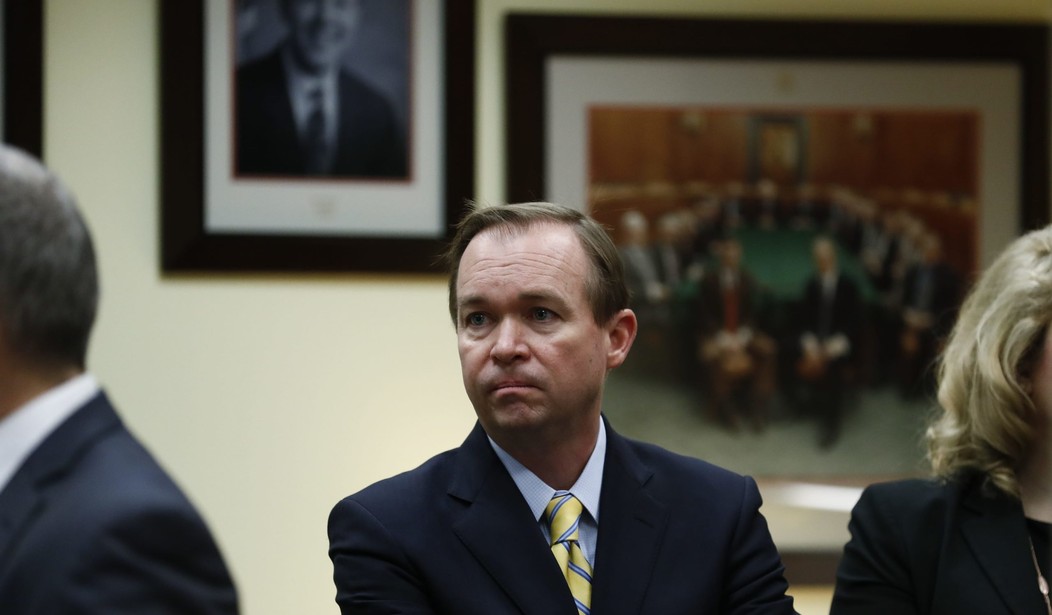Rep. Mick Mulvaney (R-S.C.), the Trump administration’s nominee to run the Office of Management and Budget, told the Senate Budget Committee today that he was ready to tell the president when he is wrong.
Opening Mulvaney’s confirmation hearing before the committee this morning, Sen. Bernie Sanders (I-Vt.) said he wondered how President Trump could have nominated someone like Mulvaney who is so “diametrically opposed” to the president’s campaign positions on saving Social Security, Medicaid and Medicare programs.
“The ideas and opinions of Mr. Mulvaney are way out of touch with the American people,” said Sanders, the ranking member of the committee. “And more importantly, they are way out of touch with what President Trump campaigned on.”
Sanders pointed out that Trump had promised, during the presidential campaign, to save Social Security, Medicare and Medicaid. But Mulvaney, Sanders said, had in the past called all three programs “unconstitutional.”
Sen. Debbie Stabenow (D-Mich.) reminded Mulvaney later in the hearing that he had once referred to Social Security as a “Ponzi scheme.”
“The only thing I know to do is to tell the president the truth, and the truth is that if we do not reform these programs … I believe in nine or 10 years the Medicaid trust fund is empty and roughly 17 or 18 years the Social Security trust fund is empty,” Mulvaney said in response to Sanders’ question of whether he would now advise Trump not to cut the entitlement programs. “…As I sit here, I will not be arguing to the president of the United States that Social Security and Medicare are unconstitutional.”
Of his nomination, Mulvaney said, “I imagine that the president knew what he was getting when he asked me to fill this role.”
And the truth Trump needs to hear, as Mulvaney sees it, is that if Medicare, Medicaid and Social Security programs are not reformed, their trust funds will run dry.
“We do have a chance to fix these programs,” Mulvaney said.
Sen. Tom Cotton (R-Ark.) said it was good that Mulvaney was willing to disagree with the White House. “The president of our country deserves a clear-eyed view, not rose-colored glasses,” Cotton said.
Mulvaney told the Budget Committee that the nation’s debt, which he pegged at nearly $20 trillion, was like a credit card bill of $260,000 for an average American family.
“I believe as a matter of principle that the debt is a problem that must be addressed sooner rather than later,” Mulvaney said in his opening remarks. “I also know that fundamental changes are necessary in the way Washington spends and taxes if we truly want a healthy economy.”
He also assured the committee that his recommendations would not include an end to Social Security.
“I am not going to force my parents to go back to work,” Mulvaney said.
However, Mulvaney did say that he would tell Trump that the Social Security retirement age should be raised to 70.
That was enough for Senate Minority Leader Chuck Schumer (D-N.Y.) to call for Mulvaney’s nomination to be withdrawn.
“These types of radical proposals totally contradict what President Trump campaigned on and many of his supporters voted for. Seniors who are Democrats, Republicans, and Independents alike should be very worried,” Schumer said in a statement.
Sanders also called for Mulvaney’s nomination to be withdrawn because of the Republican’s failure to pay payroll taxes for a woman who helped care for the Mulvaney triplets when they were born 17 years ago.
Mulvaney said he never saw the woman he hired as anything more than a babysitter or a nanny.
“She didn’t live with us, she just helped take care of the children,” Mulvaney said. “As soon as I found out 17 years later there was a problem, I did the only thing I knew how to do. I fixed it by paying the back taxes.”
Mulvaney made his name in Congress as one of the Tea Party Republicans who challenged the need to raise the nation’s debt ceiling. He didn’t back down from that stance during his second confirmation hearing of the day.
He told Sen. Claire McCaskill (D-Mo.), ranking member of the Senate Homeland Security and Governmental Affairs Committee, that it would be better for the federal government to prioritize payments rather than raise the debt ceiling limit.
McCaskill pointed out that Mulvaney’s opinion was at odds with Trump’s Treasury secretary nominee Steven Mnuchin, who has said there should be no doubt that “we are paying the bills.”
Even though he was described as a “vigilant budget hawk” by Sen. Mike Enzi (R-Wyo.) during his hearing before the Budget Committee, Mulvaney told McCaskill he was “in lock step with the president on the need to increase the top line (spending) in the Defense Department’s budget.”
But Sen. John McCain (R-Ariz.) said he was “deeply concerned” about what he described as Mulvaney’s “lack of support for our military” because of votes he cast in favor of the immediate withdrawal of U.S. troops from Afghanistan and Europe.
“You’ve spent your entire congressional career pitting the debt against the military,” said McCain.
McCain also blasted Mulvaney for his role in the 2013 government shutdown, which was in his words “a shameful chapter” in America’s history.









Join the conversation as a VIP Member